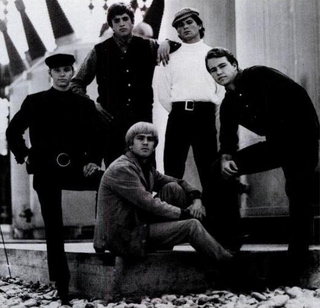
The Electric Prunes are an American psychedelic rock band, formed in Los Angeles, California, in 1965. Much of the band's music was, as music historian Richie Unterberger described it, possessed of "an eerie and sometimes anguished ambiance." It mainly consisted of material by songwriters Annette Tucker and Nancie Mantz, though the group also penned their own songs. Incorporating psychedelia and elements of embryonic electronic rock, the band's sound was marked by innovative recording techniques with fuzz-toned guitars and oscillating sound effects. In addition, guitarist Ken Williams' and singer James Lowe's concept of "free-form garage music" provided the band with a richer sonic palette and exploratory lyrical structure than many of their contemporaries.

The Shadows of Knight were an American rock band from Chicago, Illinois, that played a version of British blues influenced by their native city. When they began recording in 1965, the band's self-description was "the Stones, Animals and the Yardbirds took the Chicago blues and gave it an English interpretation. We've taken the English version of the Blues and re-added a Chicago touch," to which rock critic Richie Unterberger commented: "The Shadows of Knight's self-description was fairly accurate."
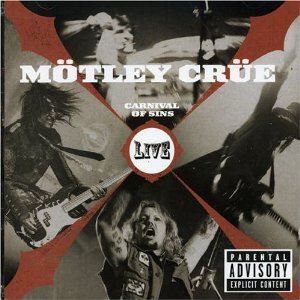
Carnival of Sins: Live is a 2-CD live album by American rock band Mötley Crüe. It was released in 2006 on Mötley Records.
Fenton Records was an independent record label founded by Dave Kalmbach in the early 1960s. The label was based in Sparta, Michigan, though is often regarded as a Grand Rapids, Michigan garage rock label.

The Gentlemen were an American garage rock band from Dallas, Texas, who were active from 1964 to 1968. They are best known for their 1966 song, "It's a Cry'n Shame", which has been recognized as one of the greatest songs in garage rock. The band is noted for the contributions of guitarist and songwriter, Seab Meador. Jimmie Vaughan, later a member the Fabulous Thunderbirds and brother of Stevie Ray Vaughan, served a brief stint for several months in the Gentlemen in late 1965 and early 1966, but did not appear on any of their recordings. He went on to play in another Dallas garage rock band, the Chessmen.
"It's a Cry'n Shame" is a song written by Seab Meador and Mike Kelley and was recorded in 1966 by the Gentlemen, an American garage rock band from Dallas, Texas who were active between 1964 and 1968. It was originally released as the B-side to "You Can't Be True" but has become by far the better-known song. "It's a Cry'n Shame" has been included in several garage rock compilations and is now recognized as one of the greatest songs in the genre.

Back from the Grave, Volume 1 (CD), is the first installment in the Back from the Grave compact disc-exclusive series of garage rock compilations put together by Tim Warren of Crypt Records. It was released on August 23, 1996. Its track listing differs from that of the LP version, which is part of the Back From the Grave LP-edition series, also on Crypt. In keeping with all of the entries in the series, and as indicated in the subheading which reads "Raw 'n' Crude Mid-60s Garage Punk!," this collection consists of songs which display the rawer and more aggressive side of the genre and are often characterized by the use of fuzztone-distorted guitars and rough vocals. The set generally excludes psychedelic, folk rock, and pop-influenced material in favor of basic primitive rock and roll. The packaging features a booklet containing well-researched liner notes written by Tim Warren which conveys basic information about each song and group, such as origin, recording date, and biographical sketches, usually written in a conversational style that includes occasional slang, anecdotes, humorous asides. The liner notes are noticeably opinionated, sometimes engaging in tongue-in-cheek insults directed at other genres of music. The booklet also includes photographs of the bands, and the front cover features a highly satirical cartoon by Mort Todd depicting a revivified "rock and roll" zombie who, along with his macabre cohorts, has just emerged from the grave to "bury" all specimens of supposedly "heretical" pop and progressive music which have come to prominence over the years, such as disco music and MTV.

Back from the Grave, Volume 1 is the first installment in the Back from the Grave series of garage rock compilations put together by Tim Warren of Crypt Records and released in 1983 on LP. In keeping with all of the entries in the series, and as indicated in the subheading which reads "Rockin' 1966 Punkers," this collection consists of songs which display the rawer and more aggressive side of the genre and are often characterized by the use of fuzztone-distorted guitars and rough vocals. The set generally excludes psychedelic, folk rock, and pop-influenced material in favor of basic primitive rock and roll. The packaging features well-researched liner notes written by Tim Warren which convey basic information about each song and group, such as origin, recording date, and biographical sketches, usually written in a conversational style that includes occasional slang, anecdotes, humorous asides. The liner notes are noticeably opinionated, sometimes engaging in tongue-in-cheek insults directed at other genres of music. The packaging also includes photographs of the bands, and the front cover features a highly satirical cartoon by Mort Todd depicting a revivified "rock and roll" zombie who, along with his macabre cohorts, has just emerged from the grave to "bury" all specimens of supposedly "heretical" pop and progressive music which have come to prominence over the years, such as disco music and MTV.
The Shy Guys were an American garage rock band from Oak Park, Michigan who were active in the 1960s. They are known for songs such as "We Gotta Go," which became a hit in Detroit and the southern Michigan area, and also in the Buffalo, New York region.
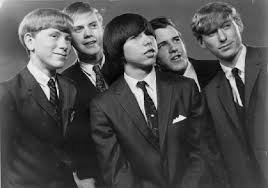
The Tidal Waves were an American garage rock band formed in Roseville, Michigan, in 1964. Despite the young ages of the group members, the Tidal Waves were one of the more accomplished musical acts in the bustling Michigan garage band scene. They are best remembered for their regional hit, a cover version of "Farmer John", which managed to reach the Top 10 of several radio station charts around Detroit.

"Time Won't Let Me" is a garage rock song that was recorded by the Outsiders, from Cleveland, Ohio, in September 1965, and which became a major hit in the United States in 1966, reaching #5 on the Billboard Hot 100 on the week of April 16 of that year. It is ranked as the 42nd biggest American hit of 1966. In Canada, the song also reached #5 in the weekly charts.

Novas were an American garage rock band from Dallas/Fort Worth, Texas, who were active in the 1960s. Noted for their harmonies, they became one of the most popular bands in the local area and toured throughout the Texas, Oklahoma, and Louisiana region, enjoying a following outside of their immediate vicinity. The group released a single featuring the song "William Junior" in 1966. In the intervening years since their breakup, the Novas' music has come to the attention of garage rock collectors and enthusiasts and their collected work is included on two anthologies.

Tonto and the Renegades were an American garage rock band from Grand Ledge, Michigan who were active between 1964 and 1969. They were formed by students from Grand Ledge High School and their name derived from the nickname of their bass player, Gary Richey, who because of his Native American heritage was referred to as "Tonto" by his friends at school. The group had several hits in the Southern Michigan region in 1966 and 1967. By the late 1960s group was being courted by major record labels, when the prospect of the Vietnam War draft caused two members to leave the band, resulting in the group's breakup. The intervening years have witnessed a revival of interest in the band's music amongst garage rock enthusiasts. Tonto and the Renegades are now best known for their song "Little Boy Blue", which is today regarded as a garage rock classic. In 2012 Tonto and The Renegades were inducted into the Michigan Rock and Roll Legends online Hall of Fame.

Scream Loud!!! The Fenton Story is a garage rock compilation consisting of songs released by Fenton Records in Grand Rapids, Michigan and the assorted vanity labels that it had pressed and distributed for various regional acts, primarily from western Michigan in the 1960s, and is available on identical LP and CD formats.* The set focuses on basic upbeat and rocking material, but includes a couple of odd and more eclectic expetions. Fenton's founder was musician and entrepreneur Dave Kalmbach, who intended the label to be a place where un-established groups could have a place to record on either the Fenton label itself or on their own vanity labels, which were usually given special custom names chosen by the bands and their management, often under the arrangement that the bands would pay themselves for most of the recording and pressing costs, but receive a certain share in royalties. Commenting on how these recordings more-or-less function as aural snapshots taken from the bygone scrapbook of a more innocent time, Stephen Thomas Earlewine commented:
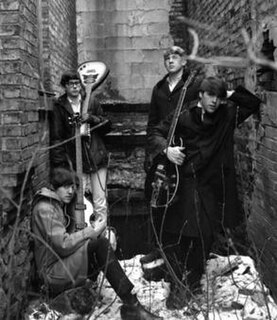
The Plagues were an American garage rock band from Lansing, Michigan who were active in the 1960s. They were led by bass player, principal songwriter, and vocalist William Malone. The group had a local and regional hit with "I’ve Been Through It Before". Malone left the band in 1966 to join the Frightened Trees, as the remaining members formed a new group out of the ashes of the Plagues, the Plain Brown Wrapper. Malone later became a successful Hollywood movie director, whose 2008 horror thriller Parasomnia included "I’ve Been Through It Before", as well as other songs by the Plagues and other 1960s garage bands. In the intervening years the Plagues work has attracted a following amongst garage rock enthusiasts and collectors.

The Jades were an American garage rock band from Sparta, Michigan who were active in the 1960s. They were one of the most popular bands in Sparta and West Michigan and cut two singles for Fenton Records owned by Dave Kalmback, who eventually became the group's manager. They are remembered for songs such as "Please Come Back" and the topical "Confined Congregation", and their work is highly regarded today by garage rock collectors and enthusiasts.
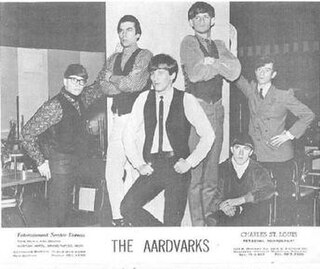
The Aardvarks were an American garage rock band from Muskegon, Michigan who were active between 1964-1968. They were one of the most popular groups in the Muskegon area and recorded three singles, two of which were issued on labels of Dave Kalmback's Fenton Records based out of Sparta, Michigan. The group scored a local hit with "I'm Higher than I'm Down", which is now considered a garage rock classic, and their work is highly regarded by collectors and enthusiasts.

The Kings Ransom were an American garage rock band from Allentown, Pennsylvania who were active from 1965-1968 and were a popular act in the Lehigh Valley area, as well as around Philadelphia. Their record "Shame" became a hit in Milton, Pennsylvania and received airplay in Michigan. In the intervening years the Kings Ransom's music has come to the attention of garage rock enthusiasts with the release of several of their songs on compilations such as Allentown Anglophile and Teenage Shutdown! Teen Jangler Blowout!
The Black Diamonds were an Australian garage rock band from Lithgow, New South Wales, which were active under different names from 1959 to 1971. By 1965 the line-up consisted of Glenn Bland on vocals and harmonica, Allen Keogh on bass guitar, Colin McAuley on drums, Alan "Olly" Oloman on lead guitar and vocals, and his younger brother Neil Oloman on rhythm guitar. They signed with Festival Records, where they released two singles. The better-known B-side track, "I Want, Need, Love You", appeared on their first single in 1966 and became a regional hit. It features an pleading vocal over a driving rhythm section and fast guitar breaks. The band toured in support of the Easybeats. In 1967 their second single, "Outside Looking In", was a hit in the Sydney area. In 1968 the group changed their name to Tymepiece and evolved into a more eclectic and progressive style. Briefly changing their name to Love Machine they released a cover version of the Tokens' single, "Lion Sleeps Tonight" (1968). They reverted to Tymepiece and issued an album, Sweet Release, in February 1971 but broke up soon after. According to Australian musicologist, Ian McFarlane, "[they] will be remembered as one of the most ferocious garage/punk outfits Australia ever produced in the 1960s."














